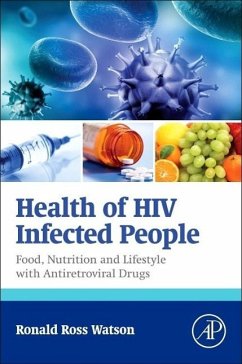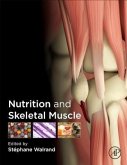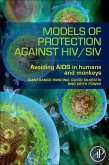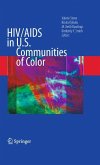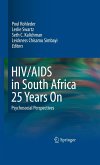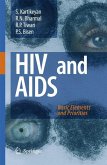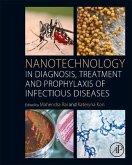Health of HIV Infected People
Food, Nutrition and Lifestyle with Antiretroviral Drugs
Herausgegeben:Watson, Ronald Ross
77,99 €
inkl. MwSt.
**Unverbindliche Preisempfehlung des Herstellers
Versandkostenfrei*Sofort lieferbar

39 °P sammeln
Health of HIV Infected People
Food, Nutrition and Lifestyle with Antiretroviral Drugs
Herausgegeben:Watson, Ronald Ross
- Gebundenes Buch
- Merkliste
- Auf die Merkliste
- Bewerten Bewerten
- Teilen
- Produkt teilen
- Produkterinnerung
- Produkterinnerung
Health of HIV Infected People: Food, Nutrition and Lifestyle with Antiretroviral Drugs provides basic and applied knowledge on the supportive roles of bioactive foods, exercise, and dietary supplements on HIV/AIDS patients receiving antiretroviral drugs.
Approaches include the application of traditional herbs and foods aiming to define both the risks and benefits of such practices. Readers will learn how to treat or ameliorate the effects of chronic retroviral disease using readily available, cheap foods, dietary supplements, and lifestyle changes with specific attention to the needs of…mehr
Andere Kunden interessierten sich auch für
![Nutrition and Skeletal Muscle Nutrition and Skeletal Muscle]() Nutrition and Skeletal Muscle150,99 €
Nutrition and Skeletal Muscle150,99 €![Models of Protection Against Hiv/Siv Models of Protection Against Hiv/Siv]() Models of Protection Against Hiv/Siv101,99 €
Models of Protection Against Hiv/Siv101,99 €![HIV/AIDS in U.S. Communities of Color HIV/AIDS in U.S. Communities of Color]() HIV/AIDS in U.S. Communities of Color38,99 €
HIV/AIDS in U.S. Communities of Color38,99 €![HIV/AIDS in South Africa 25 Years on HIV/AIDS in South Africa 25 Years on]() Poul Rohleder / Leslie Swartz / Seth C. et al. Kalichman (Hrsg.) Edwin Vorwort von CameronHIV/AIDS in South Africa 25 Years on75,99 €
Poul Rohleder / Leslie Swartz / Seth C. et al. Kalichman (Hrsg.) Edwin Vorwort von CameronHIV/AIDS in South Africa 25 Years on75,99 €![Natural Hosts of Siv Natural Hosts of Siv]() Natural Hosts of Siv143,99 €
Natural Hosts of Siv143,99 €![HIV and AIDS: HIV and AIDS:]() S. KartikeyanHIV and AIDS:149,99 €
S. KartikeyanHIV and AIDS:149,99 €![Nanotechnology in Diagnosis, Treatment and Prophylaxis of Infectious Diseases Nanotechnology in Diagnosis, Treatment and Prophylaxis of Infectious Diseases]() Nanotechnology in Diagnosis, Treatment and Prophylaxis of Infectious Diseases95,99 €
Nanotechnology in Diagnosis, Treatment and Prophylaxis of Infectious Diseases95,99 €-
-
-
Health of HIV Infected People: Food, Nutrition and Lifestyle with Antiretroviral Drugs provides basic and applied knowledge on the supportive roles of bioactive foods, exercise, and dietary supplements on HIV/AIDS patients receiving antiretroviral drugs.
Approaches include the application of traditional herbs and foods aiming to define both the risks and benefits of such practices. Readers will learn how to treat or ameliorate the effects of chronic retroviral disease using readily available, cheap foods, dietary supplements, and lifestyle changes with specific attention to the needs of patients receiving antiretroviral drugs.
This work provides the most current, concise, scientific appraisal of the efficacy (or lack thereof) of key foods, nutrients, dietary plants, and behavioral shifts in preventing and improving the quality of life of HIV infected infants and adults, while also giving the needed attention to these complex and important side effects.
Approaches include the application of traditional herbs and foods aiming to define both the risks and benefits of such practices. Readers will learn how to treat or ameliorate the effects of chronic retroviral disease using readily available, cheap foods, dietary supplements, and lifestyle changes with specific attention to the needs of patients receiving antiretroviral drugs.
This work provides the most current, concise, scientific appraisal of the efficacy (or lack thereof) of key foods, nutrients, dietary plants, and behavioral shifts in preventing and improving the quality of life of HIV infected infants and adults, while also giving the needed attention to these complex and important side effects.
Produktdetails
- Produktdetails
- Verlag: Academic Press
- Artikelnr. des Verlages: C2013-0-15173-2
- Seitenzahl: 632
- Erscheinungstermin: 26. Mai 2015
- Englisch
- Abmessung: 231mm x 157mm x 33mm
- Gewicht: 1141g
- ISBN-13: 9780128007693
- ISBN-10: 0128007699
- Artikelnr.: 42295115
- Herstellerkennzeichnung
- Libri GmbH
- Europaallee 1
- 36244 Bad Hersfeld
- gpsr@libri.de
- Verlag: Academic Press
- Artikelnr. des Verlages: C2013-0-15173-2
- Seitenzahl: 632
- Erscheinungstermin: 26. Mai 2015
- Englisch
- Abmessung: 231mm x 157mm x 33mm
- Gewicht: 1141g
- ISBN-13: 9780128007693
- ISBN-10: 0128007699
- Artikelnr.: 42295115
- Herstellerkennzeichnung
- Libri GmbH
- Europaallee 1
- 36244 Bad Hersfeld
- gpsr@libri.de
Ronald Ross Watson, PhD, is Professor of Health Promotion Sciences at the University of Arizona, Mel and Enid Zuckerman College of Public Health. Dr. Watson began his research in public health at the Harvard School of Public Health as a Fellow in 1971 doing field work on vaccines in Saudi Arabia. He has done clinical studies in Colombia, Iran, Egypt, Saudi Arabia and the United States which provides a broad international view of public health. He has served in the military reserve hospital for 17 years with extensive training in medical responses to disasters as the chief biochemistry officer of a general hospital, retiring as a Lt. Colonel. He is a distinguished member of several national and international nutrition, immunology, and cancer societies. Dr. Watson's career has involved studying many lifestyle aspects for their uses in health promotion. He has edited over 100 biomedical reference books and 450 papers and chapters. His teaching and research focuses on alcohol, tobacco
, and drugs of abuse in heart function and disease in mouse models.
, and drugs of abuse in heart function and disease in mouse models.
Section I: Food and Overview
1. Exercise and rehabilitation: Exercise in the era of HARRT in South Africa; Sonill Sooknunan Maharaj
2. Metabolic Abnormalities in HIV Infected Populations without or with Antiretroviral Therapy (ART); Nazisa Hejazi and Roslee Rajikan
3. Effects of Dietary Fat Intake on AIDS during antiretroviral therapy; Gaurav Paul
4. HIV infection-associated cancer and mycotoxins occurring in food; Gabriel Wcislo
5. Effects of omega-3 fatty acids on body composition and health in HIV/AIDS during HAART therapy; Vijay Karam Singh
6. Diet Modulation of Chronic Inflammation in individuals with AIDS; Lauren Lawson
Section II: Nutrition and Lifestyle
7. A Self-Management Framework to Assess the Need for Nutritional Supplementation in People Living with HIV/AIDS; Walter L. Ellis
8. Influence of nutrition on the human immune-deficiency viral (HIV) infection; Rao H. Prabhala
9. Nutritional Care of the HIV-Infected Child in the US: A Historical and Contemporary Perspective; Rana Chakraborty, Jamila Sheikh and Bridget Wynn
10. Vitamin D and HIV infection: Immunomodulatory and extra-skeletal effects. Prevalence, risk factors and effects of antiretroviral therapy; Miguel Cervero Sr., José Luis Agud and Victoria Alcáza
11. The role of vitamin D in HIV-infection; Vani Gandhi
12. The Relationship of Vitamin D Nutritional Status to Human Immunodeficiency Virus Infection; Allen Thomas Griffin
13. Food Is Medicine: The Ryan White Food and Nutrition Services Program as a Model for Comprehensive Food and Nutrition Services in the United States; Alissa Wassung
14. NUTRITIONAL STATUS AND CD4 CELL COUNTS IN PATIENTS WITH HIV/AIDS RECEIVING ANTIRETROVIRAL THERAPY; Ana Celia Oliveira
Section III: Nutritional Issues in HIV/AIDS patients: Focus on Antiretroviral Treated Populations
15. Interactions between anti-retrovirals and natural health products; Christine Hughes, Muhammed Zafar Iqbal Hydrie and Sunita Vohra
16. Directed Acyclic Graphs to Identify Confounders: A Case Study Exploring the Impact of Hunger on Virological Suppression Among HIV+ Illicit Drug Users Receiving HIV Treatment; Aranka Anema
17. Nutritional treatment approach for HIV-infected children on ART; Erika Aparecida Silveira and Marianne Oliveira Falco Sr.
18. Nutrition therapy for HIV-infected adults on HAART; Erika Aparecida Silveira and Marianne Oliveira Falco Sr. 19. Breastfeeding and HIV-1 infection: science and future policy; Marc Bulterys
20. Drivers and consequences of food insecurity among illicit drug users; Aranka Anema
Section IV: Foods in the Prevention and Treatment of Obesity, Diabetes and their Cardiovascular Disease as modified by HIV/AIDS during antiretroviral therapy
21. DIETARY INTERVENTIONS IN PEOPLE WITH HIV AND DIABETES; Alastair Duncan
22. Heterogeneity in nutritional and lipid profile in hiv-infected children and adolescents treated with highly active antiretroviral therapy; Jacqueline Pontes Monteiro and Roberta Garcia Salomão
23. Dietary Intervention on HIV Dyslipidaemia; nnie Seixas Bello Moreira
24. Diabetes and hyperlipidemia in treated HIV infection and approaches for cardiometabolic care; Katherine Samaras
25. Energy expenditure and substrate oxidation in HIV-infected subjects treated with antiretroviral drugs; Helena Siqueira Vassimon
26. Nutritional Interventions in reducing morbidity and mortality in people with HIV; Robert Obi
Section V: Exercise and behavioral lifestyle changes in the Prevention and Treatment of HIV/AIDS nutritional changes during antiretroviral therapy.
27. HIV/AIDS: Psychological variables and adherence to physical activity programs; Maria Irany Knackfuss Sr.
28. HIV/AIDS AND PHYSICAL EXERCISES: INTERVENTION,ADHERENCE TO HAART, AND HEALTH
Maria Irany Knackfuss Sr., Themis Cristina Mesquita Soares and Ubilina Maria da Conceição Maia
29. Physical activity and exercise for HIV-infected people; Fabiana Schuel
1. Exercise and rehabilitation: Exercise in the era of HARRT in South Africa; Sonill Sooknunan Maharaj
2. Metabolic Abnormalities in HIV Infected Populations without or with Antiretroviral Therapy (ART); Nazisa Hejazi and Roslee Rajikan
3. Effects of Dietary Fat Intake on AIDS during antiretroviral therapy; Gaurav Paul
4. HIV infection-associated cancer and mycotoxins occurring in food; Gabriel Wcislo
5. Effects of omega-3 fatty acids on body composition and health in HIV/AIDS during HAART therapy; Vijay Karam Singh
6. Diet Modulation of Chronic Inflammation in individuals with AIDS; Lauren Lawson
Section II: Nutrition and Lifestyle
7. A Self-Management Framework to Assess the Need for Nutritional Supplementation in People Living with HIV/AIDS; Walter L. Ellis
8. Influence of nutrition on the human immune-deficiency viral (HIV) infection; Rao H. Prabhala
9. Nutritional Care of the HIV-Infected Child in the US: A Historical and Contemporary Perspective; Rana Chakraborty, Jamila Sheikh and Bridget Wynn
10. Vitamin D and HIV infection: Immunomodulatory and extra-skeletal effects. Prevalence, risk factors and effects of antiretroviral therapy; Miguel Cervero Sr., José Luis Agud and Victoria Alcáza
11. The role of vitamin D in HIV-infection; Vani Gandhi
12. The Relationship of Vitamin D Nutritional Status to Human Immunodeficiency Virus Infection; Allen Thomas Griffin
13. Food Is Medicine: The Ryan White Food and Nutrition Services Program as a Model for Comprehensive Food and Nutrition Services in the United States; Alissa Wassung
14. NUTRITIONAL STATUS AND CD4 CELL COUNTS IN PATIENTS WITH HIV/AIDS RECEIVING ANTIRETROVIRAL THERAPY; Ana Celia Oliveira
Section III: Nutritional Issues in HIV/AIDS patients: Focus on Antiretroviral Treated Populations
15. Interactions between anti-retrovirals and natural health products; Christine Hughes, Muhammed Zafar Iqbal Hydrie and Sunita Vohra
16. Directed Acyclic Graphs to Identify Confounders: A Case Study Exploring the Impact of Hunger on Virological Suppression Among HIV+ Illicit Drug Users Receiving HIV Treatment; Aranka Anema
17. Nutritional treatment approach for HIV-infected children on ART; Erika Aparecida Silveira and Marianne Oliveira Falco Sr.
18. Nutrition therapy for HIV-infected adults on HAART; Erika Aparecida Silveira and Marianne Oliveira Falco Sr. 19. Breastfeeding and HIV-1 infection: science and future policy; Marc Bulterys
20. Drivers and consequences of food insecurity among illicit drug users; Aranka Anema
Section IV: Foods in the Prevention and Treatment of Obesity, Diabetes and their Cardiovascular Disease as modified by HIV/AIDS during antiretroviral therapy
21. DIETARY INTERVENTIONS IN PEOPLE WITH HIV AND DIABETES; Alastair Duncan
22. Heterogeneity in nutritional and lipid profile in hiv-infected children and adolescents treated with highly active antiretroviral therapy; Jacqueline Pontes Monteiro and Roberta Garcia Salomão
23. Dietary Intervention on HIV Dyslipidaemia; nnie Seixas Bello Moreira
24. Diabetes and hyperlipidemia in treated HIV infection and approaches for cardiometabolic care; Katherine Samaras
25. Energy expenditure and substrate oxidation in HIV-infected subjects treated with antiretroviral drugs; Helena Siqueira Vassimon
26. Nutritional Interventions in reducing morbidity and mortality in people with HIV; Robert Obi
Section V: Exercise and behavioral lifestyle changes in the Prevention and Treatment of HIV/AIDS nutritional changes during antiretroviral therapy.
27. HIV/AIDS: Psychological variables and adherence to physical activity programs; Maria Irany Knackfuss Sr.
28. HIV/AIDS AND PHYSICAL EXERCISES: INTERVENTION,ADHERENCE TO HAART, AND HEALTH
Maria Irany Knackfuss Sr., Themis Cristina Mesquita Soares and Ubilina Maria da Conceição Maia
29. Physical activity and exercise for HIV-infected people; Fabiana Schuel
Section I: Food and Overview
1. Exercise and rehabilitation: Exercise in the era of HARRT in South Africa; Sonill Sooknunan Maharaj
2. Metabolic Abnormalities in HIV Infected Populations without or with Antiretroviral Therapy (ART); Nazisa Hejazi and Roslee Rajikan
3. Effects of Dietary Fat Intake on AIDS during antiretroviral therapy; Gaurav Paul
4. HIV infection-associated cancer and mycotoxins occurring in food; Gabriel Wcislo
5. Effects of omega-3 fatty acids on body composition and health in HIV/AIDS during HAART therapy; Vijay Karam Singh
6. Diet Modulation of Chronic Inflammation in individuals with AIDS; Lauren Lawson
Section II: Nutrition and Lifestyle
7. A Self-Management Framework to Assess the Need for Nutritional Supplementation in People Living with HIV/AIDS; Walter L. Ellis
8. Influence of nutrition on the human immune-deficiency viral (HIV) infection; Rao H. Prabhala
9. Nutritional Care of the HIV-Infected Child in the US: A Historical and Contemporary Perspective; Rana Chakraborty, Jamila Sheikh and Bridget Wynn
10. Vitamin D and HIV infection: Immunomodulatory and extra-skeletal effects. Prevalence, risk factors and effects of antiretroviral therapy; Miguel Cervero Sr., José Luis Agud and Victoria Alcáza
11. The role of vitamin D in HIV-infection; Vani Gandhi
12. The Relationship of Vitamin D Nutritional Status to Human Immunodeficiency Virus Infection; Allen Thomas Griffin
13. Food Is Medicine: The Ryan White Food and Nutrition Services Program as a Model for Comprehensive Food and Nutrition Services in the United States; Alissa Wassung
14. NUTRITIONAL STATUS AND CD4 CELL COUNTS IN PATIENTS WITH HIV/AIDS RECEIVING ANTIRETROVIRAL THERAPY; Ana Celia Oliveira
Section III: Nutritional Issues in HIV/AIDS patients: Focus on Antiretroviral Treated Populations
15. Interactions between anti-retrovirals and natural health products; Christine Hughes, Muhammed Zafar Iqbal Hydrie and Sunita Vohra
16. Directed Acyclic Graphs to Identify Confounders: A Case Study Exploring the Impact of Hunger on Virological Suppression Among HIV+ Illicit Drug Users Receiving HIV Treatment; Aranka Anema
17. Nutritional treatment approach for HIV-infected children on ART; Erika Aparecida Silveira and Marianne Oliveira Falco Sr.
18. Nutrition therapy for HIV-infected adults on HAART; Erika Aparecida Silveira and Marianne Oliveira Falco Sr. 19. Breastfeeding and HIV-1 infection: science and future policy; Marc Bulterys
20. Drivers and consequences of food insecurity among illicit drug users; Aranka Anema
Section IV: Foods in the Prevention and Treatment of Obesity, Diabetes and their Cardiovascular Disease as modified by HIV/AIDS during antiretroviral therapy
21. DIETARY INTERVENTIONS IN PEOPLE WITH HIV AND DIABETES; Alastair Duncan
22. Heterogeneity in nutritional and lipid profile in hiv-infected children and adolescents treated with highly active antiretroviral therapy; Jacqueline Pontes Monteiro and Roberta Garcia Salomão
23. Dietary Intervention on HIV Dyslipidaemia; nnie Seixas Bello Moreira
24. Diabetes and hyperlipidemia in treated HIV infection and approaches for cardiometabolic care; Katherine Samaras
25. Energy expenditure and substrate oxidation in HIV-infected subjects treated with antiretroviral drugs; Helena Siqueira Vassimon
26. Nutritional Interventions in reducing morbidity and mortality in people with HIV; Robert Obi
Section V: Exercise and behavioral lifestyle changes in the Prevention and Treatment of HIV/AIDS nutritional changes during antiretroviral therapy.
27. HIV/AIDS: Psychological variables and adherence to physical activity programs; Maria Irany Knackfuss Sr.
28. HIV/AIDS AND PHYSICAL EXERCISES: INTERVENTION,ADHERENCE TO HAART, AND HEALTH
Maria Irany Knackfuss Sr., Themis Cristina Mesquita Soares and Ubilina Maria da Conceição Maia
29. Physical activity and exercise for HIV-infected people; Fabiana Schuel
1. Exercise and rehabilitation: Exercise in the era of HARRT in South Africa; Sonill Sooknunan Maharaj
2. Metabolic Abnormalities in HIV Infected Populations without or with Antiretroviral Therapy (ART); Nazisa Hejazi and Roslee Rajikan
3. Effects of Dietary Fat Intake on AIDS during antiretroviral therapy; Gaurav Paul
4. HIV infection-associated cancer and mycotoxins occurring in food; Gabriel Wcislo
5. Effects of omega-3 fatty acids on body composition and health in HIV/AIDS during HAART therapy; Vijay Karam Singh
6. Diet Modulation of Chronic Inflammation in individuals with AIDS; Lauren Lawson
Section II: Nutrition and Lifestyle
7. A Self-Management Framework to Assess the Need for Nutritional Supplementation in People Living with HIV/AIDS; Walter L. Ellis
8. Influence of nutrition on the human immune-deficiency viral (HIV) infection; Rao H. Prabhala
9. Nutritional Care of the HIV-Infected Child in the US: A Historical and Contemporary Perspective; Rana Chakraborty, Jamila Sheikh and Bridget Wynn
10. Vitamin D and HIV infection: Immunomodulatory and extra-skeletal effects. Prevalence, risk factors and effects of antiretroviral therapy; Miguel Cervero Sr., José Luis Agud and Victoria Alcáza
11. The role of vitamin D in HIV-infection; Vani Gandhi
12. The Relationship of Vitamin D Nutritional Status to Human Immunodeficiency Virus Infection; Allen Thomas Griffin
13. Food Is Medicine: The Ryan White Food and Nutrition Services Program as a Model for Comprehensive Food and Nutrition Services in the United States; Alissa Wassung
14. NUTRITIONAL STATUS AND CD4 CELL COUNTS IN PATIENTS WITH HIV/AIDS RECEIVING ANTIRETROVIRAL THERAPY; Ana Celia Oliveira
Section III: Nutritional Issues in HIV/AIDS patients: Focus on Antiretroviral Treated Populations
15. Interactions between anti-retrovirals and natural health products; Christine Hughes, Muhammed Zafar Iqbal Hydrie and Sunita Vohra
16. Directed Acyclic Graphs to Identify Confounders: A Case Study Exploring the Impact of Hunger on Virological Suppression Among HIV+ Illicit Drug Users Receiving HIV Treatment; Aranka Anema
17. Nutritional treatment approach for HIV-infected children on ART; Erika Aparecida Silveira and Marianne Oliveira Falco Sr.
18. Nutrition therapy for HIV-infected adults on HAART; Erika Aparecida Silveira and Marianne Oliveira Falco Sr. 19. Breastfeeding and HIV-1 infection: science and future policy; Marc Bulterys
20. Drivers and consequences of food insecurity among illicit drug users; Aranka Anema
Section IV: Foods in the Prevention and Treatment of Obesity, Diabetes and their Cardiovascular Disease as modified by HIV/AIDS during antiretroviral therapy
21. DIETARY INTERVENTIONS IN PEOPLE WITH HIV AND DIABETES; Alastair Duncan
22. Heterogeneity in nutritional and lipid profile in hiv-infected children and adolescents treated with highly active antiretroviral therapy; Jacqueline Pontes Monteiro and Roberta Garcia Salomão
23. Dietary Intervention on HIV Dyslipidaemia; nnie Seixas Bello Moreira
24. Diabetes and hyperlipidemia in treated HIV infection and approaches for cardiometabolic care; Katherine Samaras
25. Energy expenditure and substrate oxidation in HIV-infected subjects treated with antiretroviral drugs; Helena Siqueira Vassimon
26. Nutritional Interventions in reducing morbidity and mortality in people with HIV; Robert Obi
Section V: Exercise and behavioral lifestyle changes in the Prevention and Treatment of HIV/AIDS nutritional changes during antiretroviral therapy.
27. HIV/AIDS: Psychological variables and adherence to physical activity programs; Maria Irany Knackfuss Sr.
28. HIV/AIDS AND PHYSICAL EXERCISES: INTERVENTION,ADHERENCE TO HAART, AND HEALTH
Maria Irany Knackfuss Sr., Themis Cristina Mesquita Soares and Ubilina Maria da Conceição Maia
29. Physical activity and exercise for HIV-infected people; Fabiana Schuel
